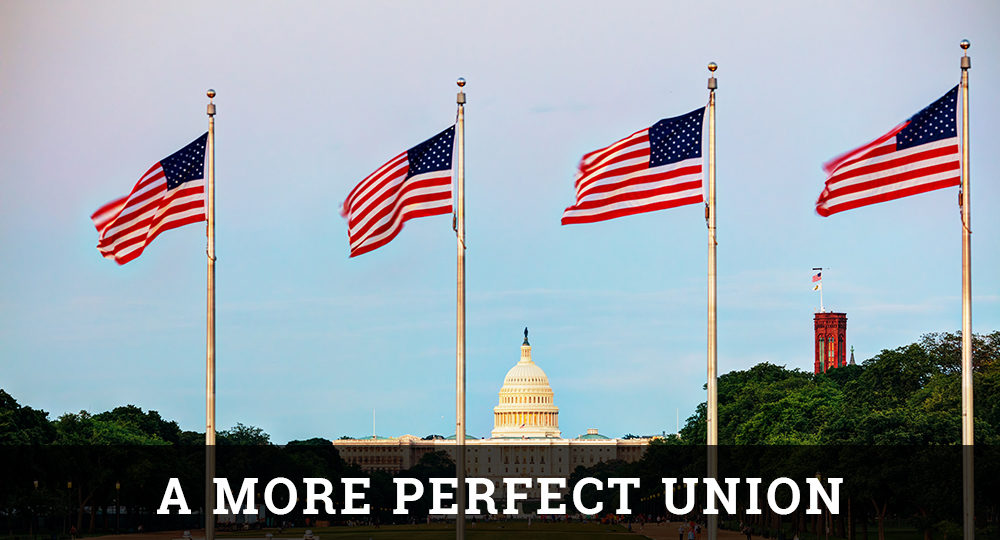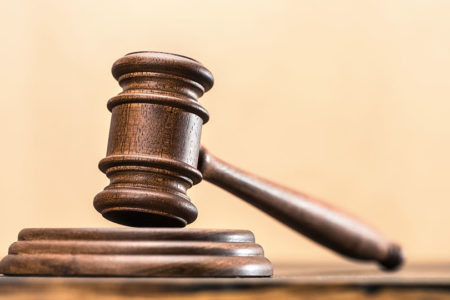A More Perfect Union May/Jun 2010
In January the U.S. Supreme Court decided the case of Citizens United v. Federal Election Commission. Although the 5–4 decision narrowly upheld freedom of speech, it also made obvious the two conflicting worldviews on the court regarding free speech and the power of government.
The appeal revolved around a film critical of Hillary Clinton. It had been produced by a conservative, nonprofit organization that wanted it to air on video-on-demand immediately prior to the national primaries during the last election cycle. However, the film was blocked by a federal judge who ruled that the provisions of the Bipartisan Campaign Reform Act (BCRA) applicable to “corporations” prohibited it from airing within 30 days of a federal election. The Supreme Court reversed the lower court and struck down that part of the BCRA, noting that Congress has created a complex tangle of campaign reform regulations that have, in fact, given birth to a “vast” system of political “censorship.”
In the majority opinion authored by Justice Anthony M. Kennedy, the court ruled that the First Amendment prohibits the government from banning speech based merely on the fact that a speaker is organized as a corporation.
The minority opinion that dissented from this decision included President Barack Obama’s recent appointee to the court, Justice Sonia Sotomayor. She was joined by the other liberal associate justices: John Paul Stevens, Ruth Bader Ginsburg, and Stephen G. Breyer.
They complained that the majority got it all wrong. They claimed the real issue was Congress’s attempt to curtail the corrupting influence of huge corporations that use their big money to cause a “distortion” in the democratic process. The case, they said, was not about free speech; it was simply about the illegal use of money during an election.
This view actually conceals a dangerous trend in Washington: the attempt to use the powerful engine of the federal government and increasingly complex regulations to crush viewpoints of citizens under the supposed guise of creating a better society. These people believe government officials, not citizens, have the right to decide what is best for our “democratic progress”; and if our most precious and fundamental freedoms suffer as a result, well, that is just the price that has to be paid.
The fact is, the Citizens United case was about freedom of speech. A non-profit group wanted to use the broadcast medium to explain why it opposed Hillary Clinton, but a federal judge blocked the attempt. A clearer threat to freedom of speech (or, for that matter, freedom of the press) can hardly be imagined.
The irony is that the majority of corporations in the United States are not multinational entities with billion-dollar budgets. Many are small or medium-sized mom-and-pop businesses created in corporate form because of legal or tax advantages. The minority opinion admitted that the campaign law would silence not only the megacorporations on the New York Stock Exchange, but also the small, “closely held corporations…strongly identified with a particular owner or founder.”
Thus, if the liberal justices had their way, all local community businesses would be silenced four weeks prior to a national election. Even more surprising, the minority opinion conceded that, under this law, various “nonprofit corporations….created for an ideological purpose” would also be censored.
But it was the separate opinion of conservative Justice Clarence Thomas that gives us the best picture of how complex government regulations can ultimately suppress viewpoints. He pointed out how laws in California required public disclosure of donations (along with the names and addresses of donors) who supported or opposed Proposition 8, which declared that only the marriage of a man and a woman would be recognized as valid.
As a result, the identities of donors supporting Prop. 8 were disseminated to opponents who “blacklisted, threatened, or otherwise targeted [them] for retaliation.” Wrote Thomas: “The director of the Los Angeles Film Festival was forced to resign after giving $1500 [to a pro-Prop. 8 effort] because opponents threatened to boycott and picket the next festival….And a woman who had managed her popular, family-owned restaurant for 26 years was forced to resign after she gave $100 because ‘throngs of [angry] protesters’ repeatedly arrived at the restaurant” and attempted to embarrass customers. In the end, he wrote, police in riot gear arrived to quell the mob.
We have reason to rejoice over the decision in Citizens United. However, President Obama denounced it, and some congressmen have vowed to side-step the Supreme Court ruling with yet another campaign “reform” bill. If the First Amendment rights of Americans are to survive, our federal lawmakers must stop stifling us with regulations that suffocate freedom of speech.






